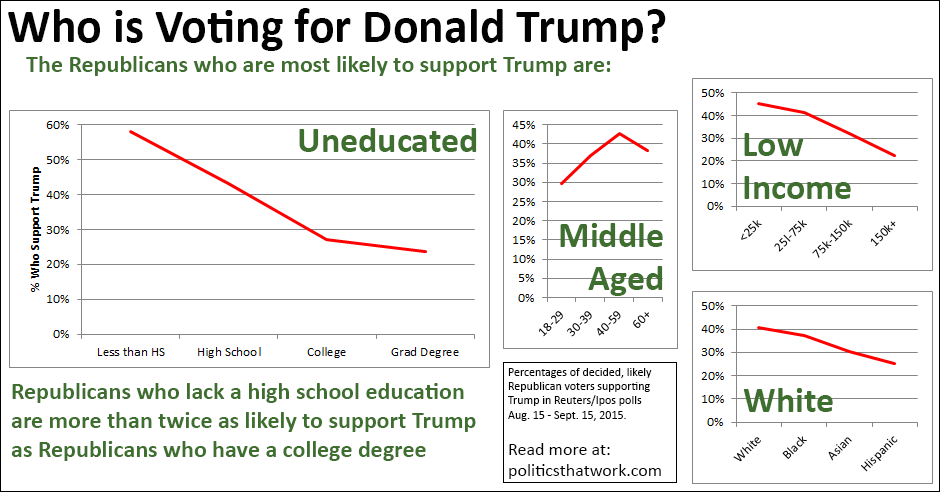
| |
Who is Voting for Trump?Trump's polling performance provides some stark insights into the condition of the GOP. Over and over since the 1960s, the Republican Party has been faced with a series of situations where it can gain favor from the majority by attacking the minority. This often works to its benefit in the short term, but over time, the list of groups the Party has attacked has become so long that the Party is painting itself into a corner where, in order to win a presidential election, it will soon need to capture the vote of nearly every single heterosexual, Christian, white voter. To start every election cycle with perhaps 30% of the voters automatically against you is not a good position. The RNC acknowledged this in the "autopsy report" that it produced following its 2012 defeat. That report emphasized the need to expand its tent, attempt to mend relations with some of the groups it has alienated and, most importantly, stop making enemies of additional demographic groups. Among the main recommendations the report made was the support for immigration reform. The core problem that the GOP has is that the same pressure that has forced it to grapple with its alienating tactics- the increasing diversity in the country- has also stirred up fears among much of its base that they are losing control of the country to minorities. So, at the same time as it has become more important for the GOP to improve its standing with minorities, its base has started demanding that the party "fight back" against the minorities for control of the country. This is the underlying conflict beneath the Republican "civil war." In short, the Republican primary voters have a choice between changing course as suggested by the autopsy report (and, frankly, nearly all political analysts) and doubling down on the appeals to bigotry. Some of the Republican presidential candidates are aligned with the strategy of expanding the GOP's tent. For example, Marco Rubio was the most public champion of the comprehensive immigration reform bill that the autopsy report called for. Jeb Bush has long been fairly moderate on immigration and seems to personally find the bigotry distasteful. But, of course, there are also a number of candidates who are on the opposite side of the Republican civil war. Ted Cruz and Mike Huckabee, for example, are spamming out overt anti-Muslim hate speech as fast as they can get the words out. But, of course, the primary champion of the anti-diversity camp in the Republican civil war is the frontrunner- Donald Trump. Trump's constant appeals to bigotry of all kinds are playing out as one might predict. He is driving up a great deal of support from the demographic segment that the GOP has traditionally performed the best in, but far less support from the segments that the autopsy report identified as being crucial. If Trump cannot perform among even Republican minorities and young people, his candidacy is likely to be a disaster among those groups in the general. An analysis of Trump's performance in the polls among Republicans from various demographic groups follows. This data all comes from Reuters' and Ipsos' amazing Polling Explorer tool. The data is the percentage of the decided voters, who do intend to vote, in polls taken between August 15th and September 15th of 2015. Education LevelDonald Trump's poll performance by educational attainment: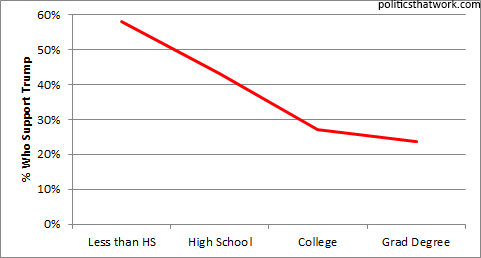 Contrast the educational makeup of Trump's supporters with that of Ben Carson: 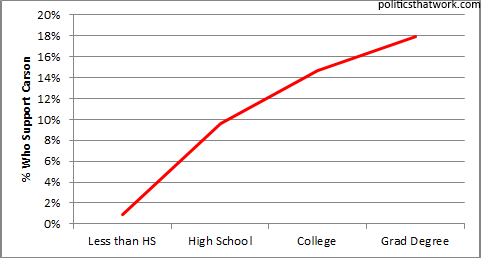 Or with the decidedly middlebrow Ted Cruz: 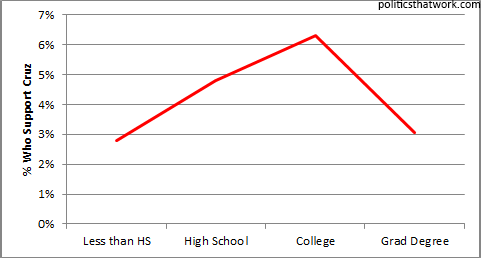 The Republican autopsy report did not address science and education, but the highly educated have for at least a couple of decades been one of the many groups that has been alienated by the Republican Party, due at least in part to the Republican Party's general hostility to education and science. The skew of Trump's support towards the least educated seems likely to exacerbate this problem. RaceDonald Trump's poll performance by race: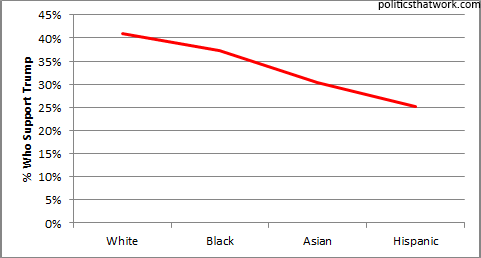 To the surprise of no one, Trump polls much better among non-Hispanic, white Republicans than among non-white or Hispanic Republicans. Trump receives 41% support from non-Hispanic, white Republicans, 37% from black Republicans, 30% from Asian Republicans and only 25% from Hispanic Republicans. While these results do show that Trump's appeal skews heavily towards white, non-Hispanic people, they are actually not as stark as one might expect among Hispanics, given Trump's constant stream of insults directed at Mexicans and immigrants. Remarkably, Trump is performing better than any other Republican candidate among Hispanic Republicans. However, it is important not to read too much into that finding. For one thing, the polling data does not explore how many of the Hispanic Republicans are "hard no's." Most primary voters prefer candidate A over candidate B, but would still vote for candidate B over whatever candidate the other party fields. It could be that some of the Hispanic Republicans who do not currently prefer Trump would actually vote for a Democrat over Trump or would not vote at all. For another thing, it is important to remember that Hispanics are not as monolithic as is sometimes assumed. Trump's attacks have largely been focused specifically on Mexicans. It may be that those attacks are not as offensive, for example, to Cuban Republicans as one might think. Most importantly, the conventional wisdom is that to win the presidency, a Republican candidate would not only need to win the votes of nearly all Republican Hispanics, but to win the votes of a significant portion of unaligned or Democratic Hispanics. Among Hispanics overall, Trump has an abysmal favorability. Contrast Trump's performance among Asian and Hispanic Republicans with that of Scott Walker: 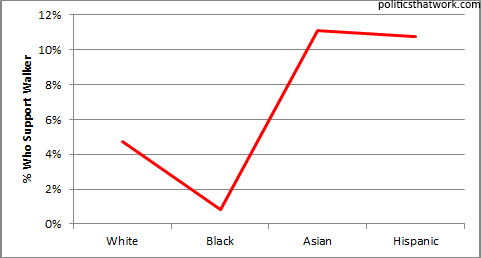 And with Jeb Bush's performance among black Republicans: 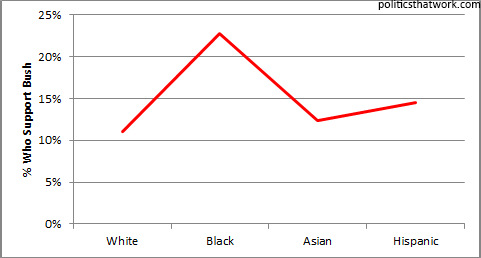 Another interesting tidbit from the polling data is Ben Carson's performance among racial groups: 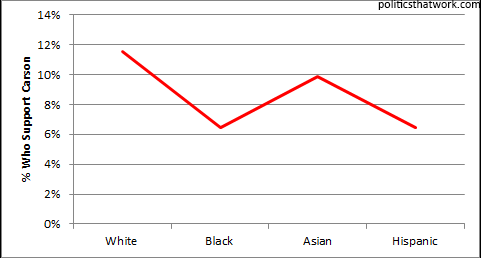 Black Republicans are less likely to support Carson than Republicans of any other race are. Only 6% of black Republicans back Carson. Compare that to Trump's 37% and Bush's 23%. Perhaps that is not surprising. Carson dedicates a significant portion of his speeches to downplaying the impact of racism in the U.S. That message is probably a lot more appealing to white Republicans than it is to black Republicans who face racism every day. IncomeDonald Trump's poll performance by income: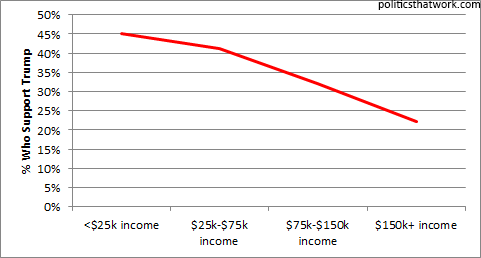 In my mind, there are two great mysteries of the Republican Party. One is how they so consistently get so many low income voters to support policies that blatantly increase economic inequality. The other is how they so consistently get uber-wealthy donors to support policies that, while they greatly increase inequality, also slow economic growth so dramatically that even the well-off end up worse off. The fact that Donald Trump's polling performance is so much better among the lowest income Republican voters adds some additional color to these mysteries. Perhaps the only thing Trump talks about more than Mexicans is how wealthy he is. Whenever possible, he does speeches and interview from the ridiculously nouveau riche Trump Tower and similar settings. While other candidates tend to aim to understate their wealth and to emphasize humble beginnings, Trump overstates his wealth every chance he gets. Yet he is killing it among low-income Republicans. Perhaps that adds support to the theory that the Republican formula is based in part on fetishizing wealth, and that no one is more inclined to fetishize wealth than those who lack it. In any case, whatever he is doing appears to be working among poor Republicans, but not working as well among better-off Republicans. The latter is less surprising, given Trump's vague promises to tax the wealthy. Low taxes on the wealth have, of course, always been one of the primary points of appeal the Republican Party has with higher-income voters. The candidate whose supporters skew most dramatically towards the wealthy, perhaps surprisingly, is John Kasich: 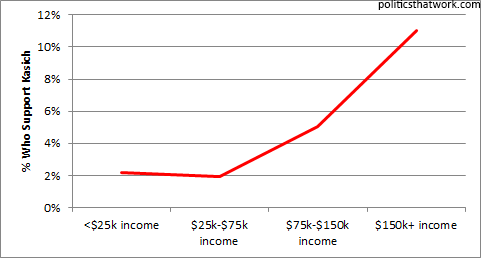 John Kasich's persona is somewhat focused on a blue-collar type of appeal, but, while his economic performance in Ohio has not been good by national standards, it has been significantly better than the other sitting governors vying for the presidency. Perhaps that is the explanation. AgeDonald Trump's poll performance by age: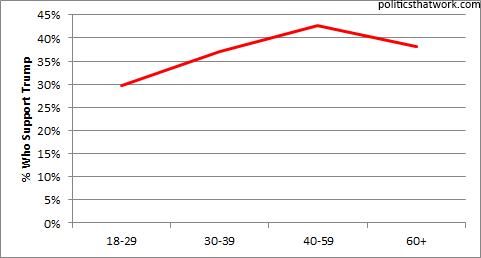 Although there has been some talk about the possibility that Trump will create excitement among younger voters, his polling results do not support that theory. Unsurprisingly, he performs the best among middle-aged Republicans. The skew towards younger and older Republicans tends to be driven by the social policy side of the candidate's agenda. Young Republicans, like all young people, tend to reject social conservatism as bigotry and Donald Trump is certainly reinforcing that response. The candidate whose supporters skew most dramatically younger is, also unsurprisingly, Rand Paul: 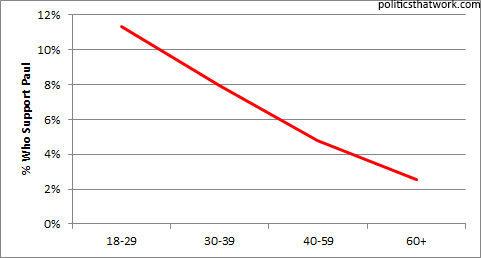 As noted above, social conservatism is not popular among younger Republicans and as a pseudo-libertarian, Paul is markedly less socially conservative than the other candidates. GenderDonald Trump's poll performance by gender: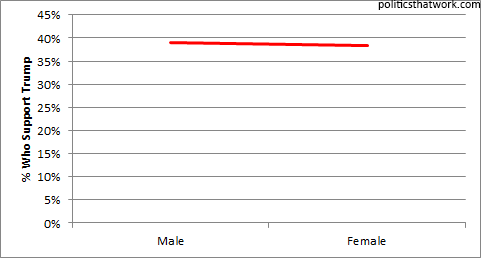 Gender appears to have almost no impact on Republicans' likelihood to support Trump. That is perhaps surprising given Trump's tendency to insult women and particularly, women's looks and menstruation. But, apparently Republican women do not consider those comments to be disqualifying. IdeologyDonald Trump's poll performance by ideology: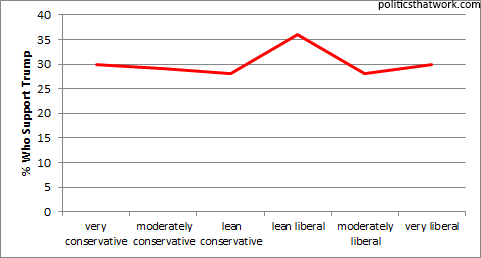 Trump polls the most strongly among Republicans who "lean liberal." That said, overall, his numbers are remarkably flat across the ideological spectrum of the GOP. Given that what little of his platform he has made public, and his history of political statements, are a seemingly random grab-bag of liberal and conservative stances, one would expect that at least the "very conservative" would reject Trump. But, that same group also has some of the strongest feelings about immigration and, apparently, is willing to overlook ideological impurity for a candidate that is on the same page as they are on immigration. It is, of course, important to note that the Republicans who consider themselves "liberal" are very few in number and it is not quite clear what views they actually support. Altogether, with the exceptions of the last two graphs, Donald Trump clearly represents a rejection of the wisdom of the RNC in the autopsy report. Trump may very well not ultimately win the Republican nomination. But, if he does, that may represent a marked decision to try ramping-up the old southern strategy, perhaps one last time before they give in to electoral reality. September 19, 2015 | |





